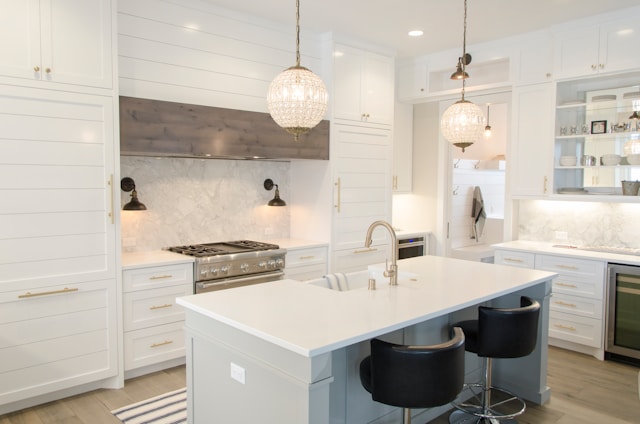In interior design, the kitchen serves as the heart of the home, where culinary magic unfolds and memories are created. Splashbacks are practical and stylish additions of various elements that contribute to a functional and aesthetically pleasing kitchen. Among the diverse materials available for splashbacks, glass has become a preferred choice for many homeowners. Renowned for its sleek appearance, versatility, and ease of maintenance, kitchen splashbacks have revolutionised kitchen design. In this comprehensive exploration, we delve into the world of glass splashbacks, uncovering their transformative potential and offering insights into their installation, maintenance, and design possibilities.
Understanding Glass Splashbacks
Glass splashbacks are panels installed on kitchen walls to protect them from splashes, stains, and moisture, particularly in areas surrounding sinks, cooktops, and countertops. Historically, tiles were the primary choice for splashbacks, offering durability and customisation options. However, the emergence of glass as a material for splashbacks has introduced a new dimension to kitchen design.
Glass splashbacks are typically made from toughened or tempered glass, which undergoes a specialised manufacturing process to enhance its strength and durability. This treatment ensures that the glass is resistant to impact and heat, making it suitable for use in the kitchen environment. Additionally, glass splashbacks are available in various colours, finishes, and designs, allowing homeowners to personalise their kitchen space according to their preferences and style.
Advantages of Glass Splashbacks
The popularity of glass splashbacks can be attributed to their many advantages over traditional materials. Here are some key benefits of opting for glass splashbacks in your kitchen:
Aesthetic Appeal: Glass splashbacks impart a contemporary and sophisticated look to any kitchen space. Their smooth, reflective surface enhances natural and artificial lighting, creating an illusion of space and openness. Moreover, the wide range of colours and finishes enables homeowners to coordinate their splashbacks with existing décor or introduce contrasting elements for visual interest.
Hygiene and Easy Maintenance: Unlike porous materials such as grout or natural stone, glass splashbacks feature a non-porous surface resistant to stains, mould, and bacteria. This makes cleaning them incredibly easy with a damp cloth wipe and mild detergent. Say goodbye to the hassle of scrubbing grout lines or worrying about stubborn stains – glass splashbacks offer unparalleled convenience and hygiene in the kitchen.
Durability and Safety: Tempered glass, used in glass splashbacks, is highly durable and resistant to breakage. The toughening process further enhances its strength, ensuring it can withstand impacts and temperature fluctuations expected in the kitchen environment. In the unlikely event of breakage, tempered glass shatters into small, blunt fragments rather than sharp shards, minimising the risk of injury.
Versatility and Customization: Glass splashbacks offer endless possibilities for customisation, allowing homeowners to unleash their creativity and design flair. Whether you prefer a bold, statement-making splashback or a subtle, understated accent, the versatility of glass enables you to achieve your desired aesthetic. The options are virtually limitless, from vibrant solid colours to intricate patterns and even digitally printed designs.
Light Reflection and Space Enhancement: One of the most striking features of glass splashbacks is their ability to reflect light and create a sense of spaciousness in the kitchen. By bouncing natural and artificial light around the room, glass splashbacks can make even the smallest kitchens feel brighter and more open. This transformative effect can significantly enhance the overall ambience and functionality of the space.
Installation Process
Installing glass splashbacks is a precise and specialised process requiring professional expertise to ensure optimal results. Here’s an overview of the typical installation process:
Measurement and Design: The first step in installing glass splashbacks involves accurately measuring the designated area to determine the required size and shape of the panels. Additionally, this is the stage where homeowners can finalise their design preferences, including the choice of colour, finish, and any customisations such as digitally printed images or patterns.
Glass Cutting and Tempering: Once the measurements and design details have been finalised, the glass panels are cut to the specified dimensions using precision tools and machinery. Subsequently, the glass undergoes a tempering process, which heats it to high temperatures and rapidly cools it to increase its strength and durability.
Surface Preparation: Before installation, the walls where the glass splashbacks will be mounted are thoroughly cleaned and prepared to ensure proper adhesion. Any existing tiles or other materials may need to be removed or treated to create a smooth and level surface for the glass panels.

0 Comments